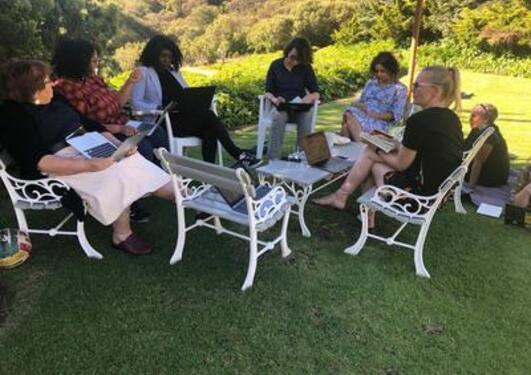International PhD students arrive in Bergen
The Centre for Women’s and Gender Research (SKOK) is currently hosting a group of international PhD students in Gender Studies from institutions in Sweden, Hungary, and South-Africa.

Main content
The students are part of a research project funded by the Swedish Foundation for Collaboration in Research and Higher Education (STINT): New Tools for Transnational Analysis in Postgraduate Intersectional Gender Research.
In the following weeks, the students will participate in a series of discussions, workshops, and events at SKOK, with the aim of strengthening the international collaboration and exchange of ideas within the field of gender research.
The stay-in residency start-up conference was held at Ida Blom’s Hus on Monday and Tuesday 18th and 19th of September 2017, and offered a varied and interesting program, with key-note lectures from local scholars, discussions on key concepts in gender research, a presentation of the book project that the group will be working on, and of course, plenty of time for social interaction for the participants to get to know each other better.
The conference focused on the geopolitics of transnational feminist research, and participants reflected on the meaning of key concepts such as intersectionality, transnationalism, and geopolitics within this field of study, both through debates and lectures.
"Our aim with this project is to reflect on how knowledge is situated by bringing together people from different parts of the world, where hierarchical power structures such as race, class, and gender are constituted and expressed in a variety of different ways. Through the discussions, we hope that the participants will become aware of the consequences that these structures of power have on the kind of knowledge that is produced," says Head of Centre at SKOK, Christine M. Jacobsen.
On Monday, Associate Professor at SKOK, Kari Jegerstedt, discussed how the contents and meanings of post-colonial theory change according to the geopolitical context in which the theory is developed and applied. She drew on her own extensive research on South African literature, and showed how the slow process of reading literature, affecting both the imagination and our desires, can help us challenge the situatedness of both writer and reader. Through two different Spivak-inspired readings of Zakes Mda’s novel The Heart of Redness, one focusing on gender, the other on the temporalities of the post-colony as/and event, Jegerstedt discussed existing analysis of the South African transition from apartheid, questioning whether post-colonial literature has prioritized explanations that favor the politics of identity and race, and underplayed the importance of the material and socio-economic conditions of the transition.
On Tuesday, political scientist at Chr. Michelsens Institute (CMI), Torunn Wimpelmann, presented her recent book on gender, violence and power in Afghanistan, The Pitfalls of Protection. In her book she examines different forms of contestation over violence against women as entry points to gender ideologies, feminist politics, statehood, and competing sovereign claims in contemporary Afghanistan.
Wimpelmann also discussed the ethical implications of her role as a Western scholar researching gender relations in Afghanistan, and how her book is implicated in geopolitical knowledge production. For Wimplemann, it became important to focus on Afghanistan as a site of transnational power relations, rather than to focus exclusively on local dynamics, as a means to address the ethical challenges of applied development studies.
The PhD candidates will be located at SKOK for the next weeks, where they will participate in writing workshops, SKOK’s annual PhD-relay, and the upcoming PhD course on Gender, Sexuality, and Geopolitical Locations, led by Randi Gressgård. Both the PhD relay and PhD course is open to PhD students at the University of Bergen.

